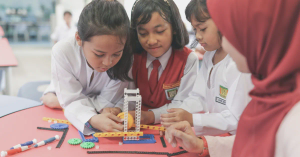When choosing a school for your child, understanding the principal’s vision, values, and leadership style can be crucial in determining the right fit. Principals play a key role in shaping the school environment, implementing policies, and ensuring student success. As a parent, asking the right questions can help you gauge whether a particular school aligns with your child's academic and social needs. Below are the top 10 questions to ask a school principal.
Top 10 questions to ask a school principal.
1. What is the School’s Educational Philosophy?
Understanding the school’s educational philosophy is essential. Does the school focus on traditional teaching methods, project-based learning, or a blend of both? Asking this question helps parents understand how the school approaches teaching and learning, ensuring it aligns with their child’s learning style and needs.
2. How Does the School Support Different Learning Styles?
Children learn in different ways. Some excel in hands-on activities, while others thrive in lecture-based environments. Asking how the school accommodates various learning styles gives insight into how inclusive and adaptable the educational environment is.
3. What is the Teacher-to-Student Ratio?
The teacher-to-student ratio can impact your child’s learning experience. Lower ratios often mean more personalized attention, while higher ratios might indicate larger class sizes, which could affect individualized learning support. This question helps determine how much one-on-one time your child might receive.
4. How Does the School Handle Behavioral Issues?
A school's disciplinary policies reflect its approach to student behavior and community values. Are there restorative justice practices in place, or is the focus on punitive measures? Asking about the school's approach to discipline will give you a clearer picture of its overall culture and how it supports student development.
5. What Extracurricular Activities Are Available?
Extracurricular programs play a key role in a child's overall development. Whether your child is interested in sports, arts, or academic clubs, understanding the variety and availability of extracurricular options helps you evaluate the school’s commitment to holistic development.
6. How Does the School Engage Parents in the Educational Process?
A strong partnership between parents and the school can greatly enhance a child's education. Ask about parent-teacher communication methods, the PTA’s involvement, and other ways parents can contribute to and stay informed about their child’s academic progress.
7. What Are the School’s Safety and Security Measures?
With safety being a top priority, it’s important to understand the school’s policies on security. Ask about procedures for emergencies, security staff presence, and how the school ensures the physical and emotional safety of students on campus.
8. How Does the School Prepare Students for the Future?
Education goes beyond the classroom. It’s important to know how a school prepares students for life beyond school, whether for higher education, vocational careers, or personal development. This question can reveal how well-rounded the curriculum is and how the school fosters critical thinking, problem-solving, and life skills.
9. What Support Services Are Offered to Students?
Some students may require additional support, whether for special education, language learning, or social-emotional well-being. Knowing what resources are available, such as counseling, tutoring, or speech therapy, will help you understand how the school supports all its students.
10. What Are the School’s Academic Outcomes?
Ultimately, parents want to ensure that their child will be academically successful. Asking about graduation rates, college admission rates, and standardized test scores gives insight into the school’s academic performance and how it compares to others in the area.
Conclusion
Asking these essential questions allows parents to make a more informed decision about their child’s education. A school principal’s responses will reveal the school’s leadership, culture, and values, helping you assess whether it’s the right environment for your child. By understanding the educational philosophy, safety protocols, and academic outcomes, you can feel confident in your school choice.







